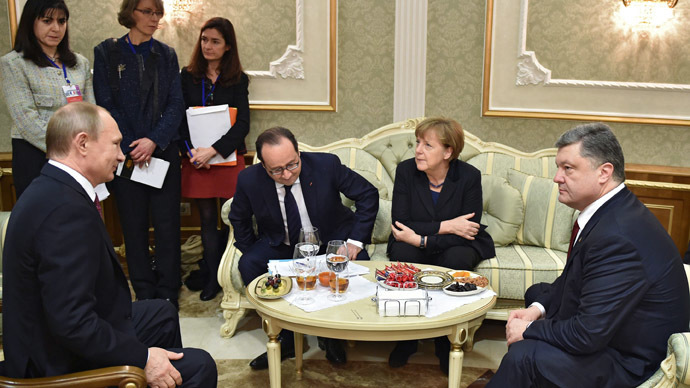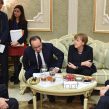
Another Ceasefire Agreement Signed in Minsk
Publication: Eurasia Daily Monitor Volume: 12 Issue: 28
By:

A marathon summit in Minsk of the leaders of Russia, Ukraine, Germany and France—which lasted for more than 15 hours nonstop, from the evening of February 11 to late morning the following day—ended with a ceasefire agreement. The warring parties agreed to stop the bloody fighting in the eastern Ukrainian region of Donbas (encompassing Donetsk and Luhansk provinces) and revitalize the original Minsk accords, signed last September. This new Minsk-2 accord in essence follows the previous Minsk-1 narrative: a comprehensive overall ceasefire within 48 hours after signing, followed by the withdrawal of heavy weaponry by both sides from the frontline—beginning in 2 days, to be accomplished in 12. A zone free of heavy weapons was stipulated by Minsk-1, but the withdrawal never happened, as both sides blamed each other. This heavy weapons exclusion zone in Donbas—some 200 kilometers long and 50–70 kilometers wide—must be policed by observers from the Organization for Security and Cooperation in Europe (OSCE) as well as a joint contact group of Russian and Ukrainian military personnel. Armed combatants will apparently be allowed to stay in this zone when the heavy weapons are removed, and it is not clear what will prevent them from shooting at each other (Interfax, February 12).
Minsk-2 calls for the withdrawal from Ukrainian territory of all foreign weapons, fighters, military personnel and mercenaries, as did the original Minsk-1. This seems to demand the withdrawal of Russian soldiers and volunteers allegedly fighting in Donbas and the weapons Russia has allegedly sent over the border. But since Russia insists it has never sent any arms or fighters into Ukraine, for Moscow there is, apparently, nothing to withdraw. OSCE Secretary General Lamberto Zannier told reporters in Dnepropetrovsk that his organization’s observers cannot identify Russian military personnel on Ukrainian territory: “We often see Russian fighters and Russian weapons [in Donbas], but we cannot say whether they are regular military personnel, if they do not tell us themselves.” Zannier added, “We are an unarmed civilian mission and cannot go into many places in Donetsk or Luhansk, because of security concerns” (Interfax, February 12).
The OSCE mission cannot ensure that the Minsk-2 accord is implemented, and the observers are not equipped to monitor compliance. The leaders of the Donbas rebels were reluctant to sign the original Minsk-1 agreement and did not want to sign Minsk-2. According to German and French leaders, “Russian President Vladimir Putin put pressure on the rebel leaders for them to sign.” The rebels sabotaged Minsk-1 and may do the same with Minsk-2, while the Kremlin may pretend it does not control them. The Luhansk rebel leader Igor Plotnitsky has been quoted as saying: “We will give Ukraine a chance to change its behavior and constitution.” If anything goes wrong, insist the rebel leaders, they will stop any implementation of the February 12 agreement, and Ukrainian President Petro Poroshenko will be held responsible (Vedomosti, February 12).
The Minsk-2 accord stipulates that new local elections under Ukrainian law must be held in the rebel-controlled part of Donbas. These elections are intended to legalize the rebel leaders. After the elections, talks must begin with the rebels about restoring Ukrainian control on the border of Donbas with Russia to prevent the present inflow of arms, munitions and fighters into Ukraine. The original Minsk agreements also envisaged Ukrainian and OSCE control of the border, but this was not implemented (Interfax, February 12).
The Moscow-backed rebels began an all-out offensive in mid-January 2015. It seems that, by now, all the warring parties have been exhausted and require an operational pause or a lull in the fighting to regroup, restock and rearm. In the last couple of weeks, the fighting has been concentrated mostly around the town of Debaltsevo—a bulge in the rebel frontline, held by Ukrainian forces since last summer. The rebels, supported by Russian artillery and troops, were trying to cut off Ukrainian forces in Debaltsevo and to force them into a humiliating surrender. The Ukrainian military denies its forces have been surrounded, though it concedes they are under constant attack. Putin told reporters in Minsk: “The rebels’ counter-offensive succeeded in the encirclement of some six to eight thousand Ukrainian soldiers in Debaltsevo. They must surrender. [Ukrainian President Petro] Poroshenko insists Debaltsevo is not surrounded. We agreed to send a joint military expert team to Debaltsevo to figure out what is really happening.” Putin called for “both sides to show restraint as the ceasefire takes hold.” Putin singled out constitutional reform, which “must take into account the wishes of the people of Donbas,” as the most important part of any possible peace agreement (Top.rbc.ru, February 12).
Putin’s main concern seems to be preventing Ukraine from ever joining the European Union, the North Atlantic Treaty Organization (NATO), or any other Euro-Atlantic institutions. The main Donetsk negotiator in Minsk, Denis Pushulin, told reporters: “A comprehensive political settlement of the conflict is possible only if Ukraine becomes a non-aligned nation” (Interfax, February 11). The Supreme Rada (Ukrainian parliament) has recently voted to reject Ukrainian non-alignment, and Poroshenko promised a referendum sometime in the future on possible NATO accession. To counter this perceived threat, no matter how remote, Putin apparently wants regime and constitutional change in Kyiv that could guarantee Ukraine will eternally continue to be a Russian dominion with limited self-rule. If Minsk-2 does not secure this main strategic objective, it may disintegrate just like Minsk-1.
The time for offensive winter warfare in Donbas is ending: spring is close, thaws will melt the soil and armor may become stuck in the seasonal mud. In late spring or early summer, full-scale fighting may resume; but now, a temporary lull seems to be in everybody’s interest, and all sides seem to have gained something positive out of Minsk-2. Soldiers and civilians may obtain relief as fighting subsides. Ukraine has been promptly promised a four-year $40 billion loan by the International Monetary Fund (IMF) to prop up its failing finances (Interfax, February 12). The French have apparently promised Putin to hand over the Mistral-class helicopter-carrying assault ship Vladivostok by next March as a reward for pressing the rebels to sign Minsk-2 (Interfax, February 12). The Vladivostok may be going to Sevastopol as early as this year for possible use in future encounters in the Black Sea. Chancellor Angela Merkel and French President Francois Hollande have been posing as peacemakers, who saved Europe from war (Interfax, February 12). A peace deal, however wobbly, always looks better than the grisly alternative.




